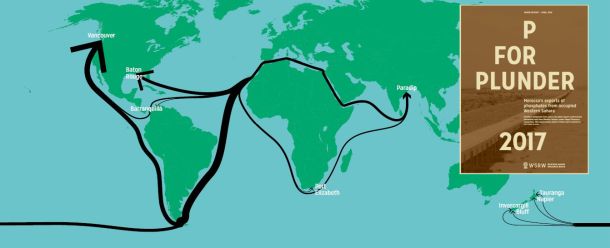
The US company will address the issue of Western Sahara next time a shipper transports gas from their gas terminal in the UK.
Photo above: Saharawis demonstrating, several years ago, against the Moroccan plunder of the territory.
Yesterday, Western Sahara Resource Watch published an overview of the gas shipments undertaken into occupied Western Sahara during the calendar year of 2020, showing that the UK that year became the most important exporter of gas into occupied Western Sahara.
Three of those shipments were from a gas terminal in Teesside, located on the north east coast of England. Two of the shipments were made onboard the vessel Eco Nemesis in June, while the third was made by the vessel JS Lekvar in August.
While the exporter from Teesside still remains unknown to Western Sahara Resource Watch (WSRW), the terminal itself is operated by a UK subsidiary of the US company ConocoPhillips.
Western Sahara Campaign UK and Western Sahara Resource Watch have been in dialogue with ConocoPhillips since November 2020, addressing aspects of international law with the company.
In a letter on 19 April 2021, the US company confirms that it takes the matter seriously:
“If a shipper indicated Western Sahara as the destination of its cargo, we would be raising this matter with the relevant shipper of the cargo”, ConocoPhillips wrote in a letter.
Such action depends, however, on a truthful reporting by the shipper. And, seemingly the shipper last year failed to report correctly:
“To the extent of our knowledge, no shipper has indicated, to date, Western Sahara as the destination of its cargoes”, ConocoPhillips wrote.
The correspondence suggests that shippers that exported gas from Teesside to the occupied territory must have failed to declare "Western Sahara” as their destination. This was done even though the true destination was revealed by the vessels as El Aaiun in Western Sahara the moment the ships left Teesside port.
ConocoPhillips failed to respond to some of the questions, for instance whether it will request further information from shippers that inform about transports to “Morocco”. Nor did it respond to whether the gas exported from Teesside originates from the UK or Norwegian sector of the North Sea.
Gas exported from Teesside originates from the UK and Norwegian gas fields in the North Sea transported to shore through a subsea pipeline. However, it has not been possible to identify the national origin of the gas exported to the occupied territory.
The vessel Eco Nemesis was operated by the Greek company Stealth Corp, which has carried out several similar voyages the last years. Western Sahara Resource Watch and The Norwegian Support Committee for Western Sahara wrote to Stealth in relation to other such shipments on 25 April 2020 and on 5 June 2020. The company has failed to answer. WSRW has not written the operator of the other vessel JS Lekvar.
Just as ConocoPhillips, the operator of the Kårstø gas terminal in Norway explained to the Norwegian Support Committee for Western Sahara in 2020 that it has “limited knowledge” about the final destinations of the vessels that depart the port.
See also letters from Western Sahara Campaign UK to ConocoPhillips on 20 November 2020 and 16 March 2021, and a letter from ConocoPhillips to Western Sahara Campaign on 24 November 2020.
New report: Western Sahara phosphate trade halved
The export of phosphate rock from occupied Western Sahara has never been lower than in 2019. This is revealed in the new WSRW report P for Plunder, published today.
New report on Western Sahara phosphate industry out now
Morocco shipped 1.93 million tonnes of phosphate out of occupied Western Sahara in 2018, worth an estimated $164 million, new report shows. Here is all you need to know about the volume, values, vessels and clients.
Airbnb places occupied Western Sahara within Morocco
The global match-maker of private accommodation has delisted providers in Israeli settlements and Crimea, but seem to apply different standards to similar situations of occupation. Saharawis object.
New report on contentious Western Sahara phosphate trade
Morocco shipped over 1.5 million tonnes of phosphate out of occupied Western Sahara in 2017, to the tune of over $142 million. But the number of international importers of the contentious conflict mineral is waning, WSRW's annual report shows.



